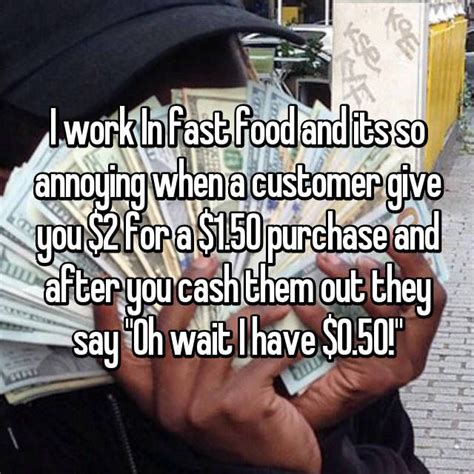
A new survey of cashiers reveals 19 common customer behaviors that retail workers find frustrating, ranging from neglecting basic hygiene to exhibiting a general lack of awareness and respect. These confessions shed light on the often-overlooked stresses faced by those in customer service roles and serve as a reminder for shoppers to consider their impact on frontline employees.
Cashier Confessions: 19 Annoying Customer Habits Revealed
Retail workers have long endured a wide array of customer behaviors, some merely irritating, others downright disrespectful. In a recent compilation of cashier confessions, 19 specific habits emerged as particularly grating, highlighting a significant disconnect between shopper awareness and the realities of the job. These revelations offer a glimpse into the daily challenges faced by cashiers and provide a valuable opportunity for customers to reflect on their own interactions.
The Hygiene Factor: Personal Grooming Gone Wrong
One of the most frequently cited complaints centered on customer hygiene. Cashiers reported being regularly subjected to unpleasant odors, often stemming from a lack of basic cleanliness. As one cashier bluntly stated, “Please shower! It’s so hard to focus on ringing you up when you smell like you haven’t showered in a week.” This sentiment reflects a common issue, where customers appear oblivious to their own body odor, creating an uncomfortable and distracting environment for retail employees. Another cashier mentioned customers “digging in their feet” while at the register as being unsanitary and disgusting.
Beyond overall cleanliness, specific habits also drew criticism. Dealing with customers who clipped their nails at the checkout was a recurring grievance, considered both unhygienic and inconsiderate. Similarly, applying makeup or picking one’s nose while interacting with a cashier was viewed as disrespectful and offensive. These actions, while seemingly minor, contribute to a negative and unsanitary work environment, underscoring the need for greater customer awareness and consideration.
The Money Mishap: Handling Cash and Cards with Carelessness
The handling of money and payment cards also proved to be a significant source of frustration. Cashiers consistently expressed annoyance with customers who handed over sweaty or crumpled bills. “Please don’t give me your sweaty money,” one cashier pleaded, a sentiment echoed by many others who found the practice both unpleasant and unhygienic. The handling of damp or dirty currency creates a potential health hazard for cashiers who must handle numerous transactions throughout their shifts.
Similarly, the presentation of payment cards elicited strong reactions. Cashiers were frequently exasperated by customers who handed over cards covered in dirt or grime. These instances not only necessitate extra cleaning efforts but also reflect a general lack of respect for the cashier and the transaction process. The expectation that cashiers should handle such items without complaint adds to the stress and discomfort of the job.
The Checkout Chaos: Lack of Preparation and Awareness
A recurring theme among the cashier confessions was the lack of preparation and awareness exhibited by some customers. Many cashiers expressed frustration with customers who waited until they reached the checkout to begin searching for their payment method or store loyalty card. “Waiting until you get to the register to find your payment is so annoying,” one cashier noted. This behavior not only slows down the checkout process but also creates unnecessary delays for other customers in line.
Furthermore, cashiers often found themselves dealing with customers who were seemingly oblivious to their surroundings. Failing to unload items from the shopping cart or to pay attention to the items being scanned were common complaints. These inattentive behaviors require cashiers to constantly prompt and assist customers, adding to their workload and slowing down the overall efficiency of the checkout process.
The Coupon Conundrum: Misunderstandings and Entitlement
The use of coupons and promotional offers also presented a variety of challenges for cashiers. Customers attempting to use expired or invalid coupons were a frequent source of frustration. As one cashier explained, “Don’t try to use expired coupons. It’s not going to work, and it’s just wasting everyone’s time.” The insistence on using invalid coupons often leads to confrontations and delays, creating a stressful situation for both the cashier and other customers.
Beyond expired coupons, misunderstandings regarding promotional offers and discounts also proved problematic. Customers often misinterpret the terms and conditions of promotions, leading to disputes and demands for discounts that do not apply. Dealing with these situations requires cashiers to patiently explain the policies and procedures, often while facing pressure from other waiting customers. Some customers also attempt to use coupons for items not included in the deal.
The Multitasking Misstep: Phone Calls and Distractions
The pervasive use of mobile phones during checkout interactions was another major source of annoyance for cashiers. Many reported being routinely ignored or interrupted by customers engaged in phone calls or text messaging. “Please get off your phone while I’m ringing you up,” one cashier pleaded, expressing a common frustration with the lack of attention and respect shown by some customers.
Engaging in phone conversations while interacting with a cashier is widely perceived as rude and inconsiderate. It not only makes it difficult for the cashier to communicate effectively but also conveys a sense of disinterest and disregard for the transaction process. The expectation that cashiers should patiently wait for customers to finish their phone calls before completing the transaction adds to the stress and inefficiency of the job.
The Price Check Predicament: Demands and Disagreements
Price discrepancies and related disputes were also a recurring theme among the cashier confessions. Customers questioning prices or demanding price matches often created tense and time-consuming situations. “Don’t argue with me about the price. I don’t make the prices,” one cashier explained, highlighting the frustration of being held responsible for pricing decisions made by management.
Demanding price matches without providing adequate proof or understanding the store’s policy was another common complaint. Cashiers often found themselves caught in the middle, having to enforce store policies while dealing with angry or entitled customers. These situations can be particularly challenging, requiring cashiers to maintain their composure and professionalism while attempting to resolve the issue.
The Returns Rigmarole: Abuses and Entitlement
The handling of returns and exchanges also presented a variety of challenges for cashiers. Customers attempting to return items without receipts or outside of the store’s return policy were a frequent source of frustration. “Don’t try to return something without a receipt. It’s not going to work,” one cashier stated, emphasizing the importance of adhering to store policies.
Beyond policy violations, some customers were accused of abusing the return system, attempting to return used or damaged items. These instances not only create a financial loss for the store but also place additional stress on the cashiers who must handle the return process. The expectation that cashiers should accept these returns without question adds to the burden of the job. Some customers will also purchase an item, use it, and then attempt to return it as new.
The Small Talk Stumble: Unwanted Conversations and Inappropriate Comments
While friendly interactions are often appreciated, cashiers also reported being subjected to unwanted conversations and inappropriate comments. Customers attempting to engage in overly personal or political discussions were a common complaint. “Don’t try to start a political debate with me. I’m just trying to do my job,” one cashier explained, highlighting the need for professional boundaries.
Inappropriate comments, particularly those of a sexual or discriminatory nature, were also reported. These instances create a hostile and uncomfortable work environment for cashiers, underscoring the importance of treating all retail employees with respect and dignity. Cashiers are there to perform a service, not to be subjected to personal or offensive remarks.
The Discount Demands: Unreasonable Expectations and Entitlement
Demanding discounts or special treatment without justification was another recurring theme among the cashier confessions. Customers attempting to negotiate prices or request discounts simply because they felt entitled to them were a frequent source of frustration. “Don’t ask me for a discount just because. I don’t have the authority to give you one,” one cashier explained, emphasizing the limitations of their position.
These demands often stem from a sense of entitlement, where customers believe they deserve special treatment simply because they are customers. This attitude not only disrespects the cashier but also undermines the store’s pricing policies and procedures. The expectation that cashiers should accommodate these unreasonable demands adds to the stress and pressure of the job.
The Item Intrusion: Last-Minute Additions and Changes
Last-minute additions or changes to orders also proved to be a significant source of frustration for cashiers. Customers adding items to their order after the transaction has already begun or changing their mind about items already scanned can disrupt the flow of the checkout process. “Don’t add items to your order after I’ve already started ringing you up,” one cashier pleaded, expressing a common annoyance with these last-minute changes.
These additions and changes not only slow down the checkout process but also require cashiers to manually adjust the transaction, potentially leading to errors or delays. The expectation that cashiers should seamlessly accommodate these changes without complaint adds to the pressure and inefficiency of the job.
The Tip Tussle: The Question of Tipping
The issue of tipping, while not always applicable in traditional retail settings, also emerged in some of the cashier confessions. In certain businesses, such as cafes or restaurants where cashiers also handle food preparation, the expectation of tipping can create awkward and uncomfortable situations. Customers unsure about whether or not to tip or those who openly refuse to tip can create tension and resentment.
The question of whether or not to tip cashiers is a complex one, often depending on the specific business and the services provided. However, regardless of the tipping norms, it is important to treat all retail employees with respect and consideration, regardless of whether or not a tip is given. Some customers will also attempt to tip very small amounts to be funny or rude.
The Managerial Melee: Threatening to “Speak to the Manager”
The threat of speaking to the manager was a tactic often used by disgruntled customers, and cashiers frequently cited it as a source of stress and frustration. Customers threatening to complain to management in order to get their way or to bully cashiers into bending the rules created a hostile and uncomfortable environment. “Don’t threaten to speak to my manager, it’s not going to change anything,” stated one cashier.
This tactic not only undermines the authority of the cashier but also places unnecessary pressure on them to resolve the issue in the customer’s favor. The expectation that cashiers should tolerate these threats without complaint adds to the stress and powerlessness of the job.
The Disrespectful Dismissal: General Rudeness and Lack of Politeness
Above all else, the most common complaint among the cashier confessions was simply a lack of basic politeness and respect. Customers who were rude, dismissive, or condescending created a negative and demoralizing work environment for cashiers. “Just be nice! It’s not that hard,” one cashier pleaded, summarizing the simple request for basic human decency.
Treating cashiers with respect and courtesy is essential for creating a positive and productive work environment. A simple “please” and “thank you” can go a long way in showing appreciation for their work and acknowledging their humanity. Remember they are people trying to make a living.
The Bottom Line: Empathy and Awareness in Customer Interactions
The cashier confessions reveal a common thread: a need for greater empathy and awareness in customer interactions. By recognizing the challenges and frustrations faced by retail workers, customers can make a conscious effort to be more considerate and respectful in their interactions. Small acts of kindness and politeness can have a significant impact on the well-being of cashiers and contribute to a more positive and productive retail environment.
These confessions serve as a valuable reminder that retail workers are human beings with feelings and deserve to be treated with dignity and respect. By practicing empathy and awareness, customers can help create a more positive and supportive environment for those who serve them every day.
Frequently Asked Questions (FAQ)
1. What are some of the most common annoying habits of customers, according to cashiers?
Cashiers identified several common annoying habits, including poor personal hygiene (e.g., body odor, nail clipping at the register), handling money and payment cards carelessly (e.g., sweaty money, dirty cards), lack of preparation at checkout (e.g., waiting until the last minute to find payment), misuse of coupons (e.g., expired coupons), talking on the phone during transactions, arguing about prices, and attempting to return items without receipts. They also found rudeness and lack of common courtesy very annoying.
2. How does poor customer hygiene affect cashiers?
Poor customer hygiene, such as strong body odor or unsanitary habits like clipping nails or picking one’s nose at the register, creates an uncomfortable and potentially unhygienic work environment for cashiers. This can make it difficult for cashiers to focus on their job and can be offensive and disrespectful.
3. What can customers do to improve their interactions with cashiers?
Customers can improve their interactions with cashiers by practicing basic hygiene, being prepared with their payment method, respecting store policies, being polite and courteous, and refraining from engaging in distracting behaviors like talking on the phone. Also, treat them like a human.
4. Why is it considered rude to talk on the phone while checking out?
Talking on the phone during checkout is considered rude because it shows a lack of attention and respect for the cashier. It makes it difficult for the cashier to communicate effectively and conveys a sense of disinterest in the transaction. It implies their time isn’t valuable.
5. What is the best way to handle price discrepancies or coupon issues at the checkout?
The best way to handle price discrepancies or coupon issues is to remain calm and polite. Clearly explain the issue to the cashier and provide any necessary documentation, such as the advertised price or the coupon itself. Avoid arguing or becoming confrontational, as the cashier is often just following store policies. If the issue cannot be resolved at the register, calmly request to speak with a manager. Understand that the cashier has little to no control over the pricing.









